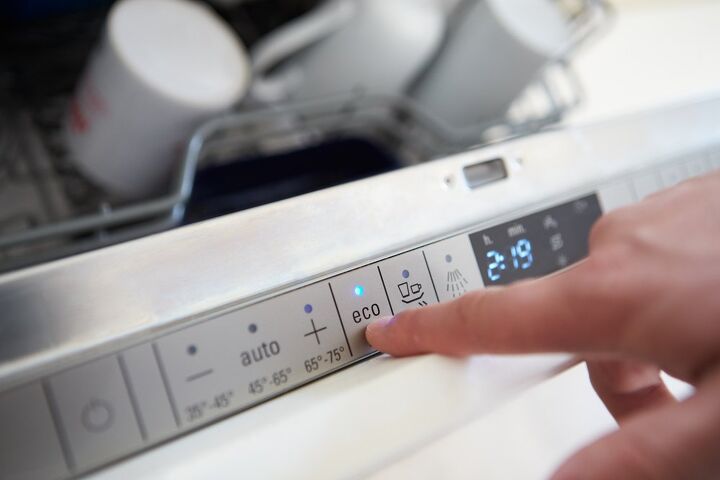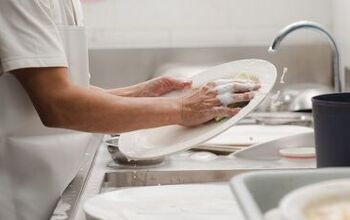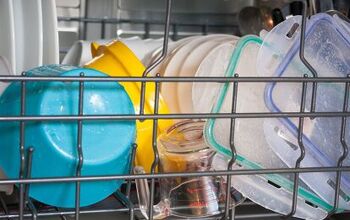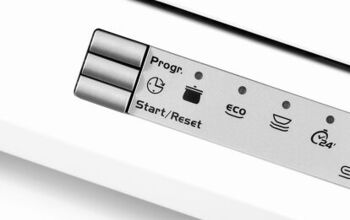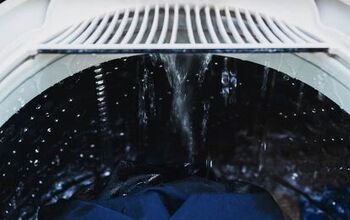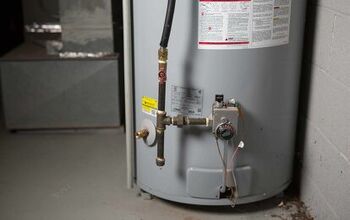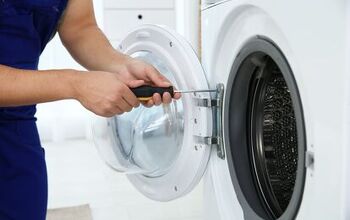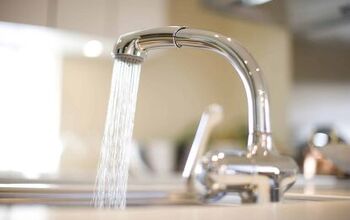How Long Does a Dishwasher Run? (Average Cycle Times)

Dishwashers can be the ultimate helper in the kitchen. It doesn’t matter if it is a small cleanup effort or picking up after a large family gathering; a dishwasher can make everything that much easier. Even better, they make keeping glasses, silverware, and plates look sparkling clean again.
Standard dishwashers run for between 1 ½ and 4 hours based on the type of cycle that you select. The condition of your dishes and the sensor itself can determine how long it takes to run the dishwasher. Dirtier dishes require longer cycles and worn-out sensors can often lengthen the cycle time.
How Long is the Average Dishwasher Cycle?
While cycle time can certainly vary based on model type, the other largest factor is the cycle type. Depending on the cycle selected, the average run time can be anywhere from 30 minutes to 4 hours.
There are also a variety of factors that can play into the length of your dishwasher cycle. Keep these factors in mind when programming your next load.
- Sensor readings. When you have a new unit, the sensors are brand new. But as they wear over time, it can impact the overall length of cycle that your dishwasher runs.
- Dirt level. The other major factor in cycle time is the dirt level of your dishes. It is important to know that dishwashers are not meant to handle large chunks of food and debris. Still, if your dishes have a thick layer of grime on them, it will take the dishwasher longer to do the job.
- Water heating. The last factor in your cycle time is how long it takes the water to heat up between each of the phases. With newer units, this can be a short interval. Older dishwashers may take slightly longer to properly heat up.
How Does Dishwasher Cycle Time Compare to Older Models?
It may seem like older dishwasher models got the job done quicker than some of the newer models. While that may be the case, there’s a reason for that. Most new models are built to hit certain energy efficiency guidelines, so it takes longer for them to clean than some of the older models.
New models use less energy than those of the past, but it takes them longer to do the job. So, if you have a modern dishwasher that seemingly runs for longer than the older models, that’s because it does. You’re saving energy but losing cleaning time.
How to Tell if Cycle Times are Too Long
There may come a time where you notice that your dishwasher is running slightly longer than normal. There are a few explanations for this, though it can be totally normal depending on the circumstances.
- Calibration. Sensor calibration is standard for new dishwashers. If you just got yours and the initial runtime seems long, don’t interrupt the cycle. This is the sensor calibration process and will help the sensors adjust to reach optimal performance levels.
- Check your dishes. If cycle times seem too long, it could be that your dishes are especially dirty. When the dishes are really dirty, your dishwasher will default to a longer cycle so that the dishes will be optimally cleaned.
- Water hardness. Longer cycle times can also be due to water hardness. Should your area have mineral or limescale build-up, it can actually interfere with the sensors in the dishwasher, creating longer cycle times. It is a good idea to use dishwasher tablets each month to help get rid of that build up.
Check these factors out first and then monitor your run times. If you think that they are still longer than normal, it might be worth contacting the manufacturer. They should send out a technician to assess the problem and, if necessary, implement a fix.
Do Dishwashers Use A Lot of Electricity?
The vast majority of dishwashers out there run on electricity. So, with each load, you are using the required electricity in addition to the water necessary to do the job. But what are these costs involved in running the dishwasher?
Reports estimate that the average dishwasher uses an average of somewhere around 1.5 kWh to run the normal load of dishes. This excludes incoming water costs, which equate to about $0.17 per load. Over the course of 10 years – the average lifespan of a dishwasher – the average load will cost about $0.46.
Is it Cheaper to Wash by Hand or Use a Dishwasher?
In theory, washing the dishes by hand should cost less. But does it? It requires a deeper look to truly determine the answer.
Washing by Hand
Washing by hand requires no electricity but is it actually cheaper than running the dishwasher? When you consider the cost of soap and water, not to mention that we are likely less efficient than the average dishwasher, the cost difference may not be nearly as drastic as one would think.
Not only that, but there are the time considerations to be aware of. It will no doubt take longer to wash and dry dishes by hand. Is that time spent worth the time saved by a dishwasher? Likely not and can make the investment in a dishwasher a stronger one.
Using a Dishwasher
Even though it requires electricity to run, a dishwasher is likely the cheaper option. For starters, it uses far less water than you might be washing the dishes by hand. Those costs could be enough to offset the electricity charges.
And that’s not even taking into consideration time costs. Let’s say that washing the dishes by hand saves you something like $2 per hour; that is nowhere near enough savings to make up for all the time that it takes to wash the dishes by hand.
How to Get the Greatest Energy Efficiency Out of a Dishwasher
Still looking to save some money on your dishwasher loads? There are a few tips that you can implement to make things just a bit cheaper on the whole. Keep in mind that most modern dishwashers are pretty efficient, so the savings should not be drastic.
- Only run full loads. Some people will run a daily load even if the dishwasher isn’t full. And for the most part, the costs will be minimally larger than normal. But for optimal efficiency, only run the dishwasher when it is totally full. You’ll notice at least a little bit of savings in the end.
- Don’t pre-wash. There is a difference between rinsing off food scraps and pre-washing. Save yourself some time and water by simply rinsing away food scraps and letting the dishwasher do the rest. Even longer cycles these days are more efficient than the short cycles of the past.
- Air dry. Another way to save on dishwasher costs is to let your dishes air dry instead of going through the heated dry option. The dishwasher uses a strong heat that dries the dishes after the washing cycle has completed. By opting for an air dry, you can save the electricity required to perform that drying operation.
- Load it properly. Improperly loaded dishwashers can lead to ineffective cleaning. Ineffective cleaning means you’ll need to run another cycle. By loading the dishwasher the right way, you can cut down on cycle time, saving time, electricity, and money in the end.
Consider Dishwasher Placement
Did you know that the placement of your dishwasher can have an impact on the other appliances in your home? For instance, if you have it next to the refrigerator, it can cause the fridge to work that much harder to do its job.
The time of day matters, too. During the hotter hours of the day, running your dishwasher can make it that much more difficult to cool your home. Consider running the dishwasher in the morning or later in the evening for optimal efficiency.
Things That You Should Never Put in the Dishwasher
While your dishwasher is there to make things easier from a cleaning aspect, it isn’t a perfect machine. Not only that, but there are certain things that you should never, under any circumstances, put in the dishwasher.
Anything Made of Wood
Abstain from putting wooden utensils, knives with wooden handles, or cutting boards in the dishwasher. The reason is that the heat from the drying cycle can cause the wood to potentially warp and crack. Not only that, but certain types of dishwasher detergents can be particularly abrasive, scratching up the wood over long periods of time.
Cast Iron
You’ve probably heard this one before but running cast iron in the dishwasher can be a bad idea. It takes some effort to “break-in” your cast iron cookware and putting it into the dishwasher can undo all of that hard work. Moreover, you won’t actually get as good a clean on it as you would by hand.
Aluminum Cookware
While aluminum pans and pots can technically go in the dishwasher, they will fade and oxidize over time starting with cycle one. Stainless steel, meanwhile, can typically go in the dishwasher though you should always adhere to any specific manufacturer guidelines above all else.

Ryan Womeldorf has more than a decade of experience writing. He loves to blog about construction, plumbing, and other home topics. Ryan also loves hockey and a lifelong Buffalo sports fan.
More by Ryan Womeldorf



